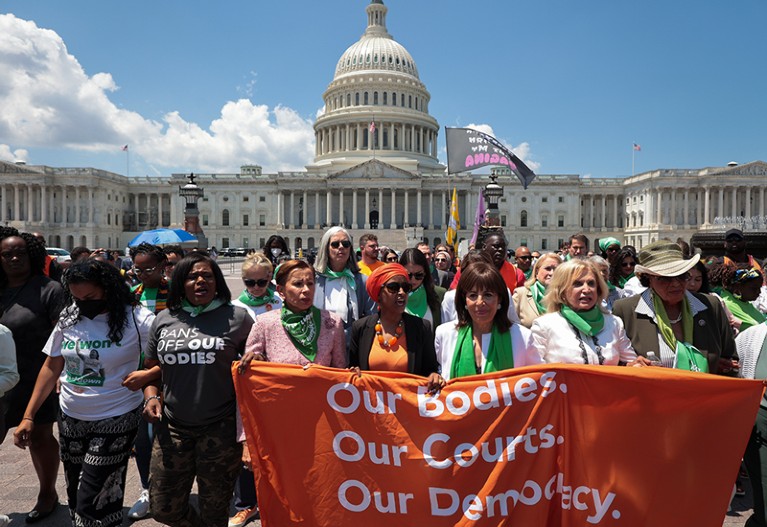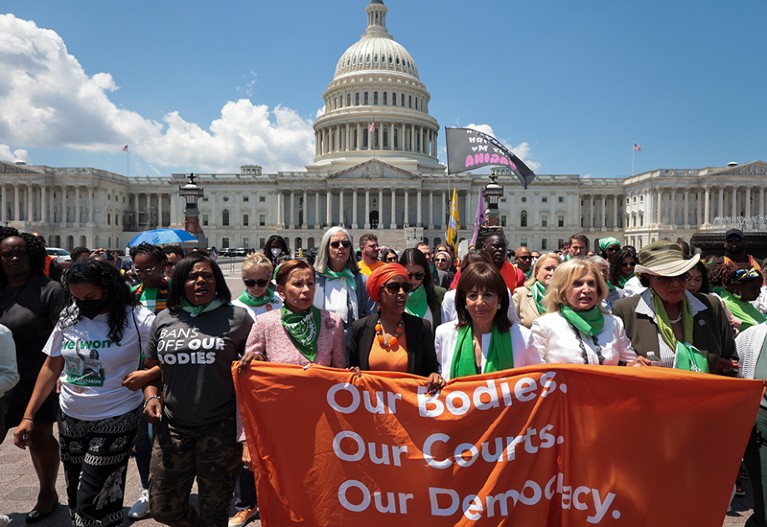
Abortion-rights demonstrators outside the US Capitol in July 2022 after the Supreme Court reversed the Roe v. Wade decision that upheld a constitutional right to abortion.Credit: Oliver Contreras/For The Washington Post/Getty
For the past five decades, the United States has been a top destination for international early-career researchers to do their training in a PhD or postdoctoral post. Since the 1960s, post-cold-war US diplomatic policies have aimed to attract foreign scholars, especially those in then-budding democracies (M. O’Mara Soc. Sci. Hist. 36, 583–615; 2012). After a steady increase, numbers peaked in 2016, when more than one million students — undergraduate and graduate — were enrolled to study in the United States. The number of international students then began to decline slowly: graduate-student numbers dipped by 1.3%, to 377,943, in 2018, according to the Institute of International Education, a student-exchange non-profit organization based in New York City. During the 2020–21 academic year, the first of the COVID-19 pandemic, the number sank by 12.1%, to 329,272 graduate students. That same year, numbers of international scholars in the United States (specifically, postdocs and visiting researchers) plummeted by 31%, from 123,508 to 85,528.
It’s unclear whether those numbers will recover, or how long that might take. In August, The Wall Street Journal reported that the number of international-student F-1 visas issued to Chinese students, who make up the overwhelming majority of people coming to attend US universities, had declined by more than 50% in the first 6 months of 2022 compared with the same period in 2019. Furthermore, a September 2021 poll for the U.S.–China Perception Monitor found that 62% of Chinese respondents had a view of the United States that was either “very unfavorable” or “unfavorable”.
Universities in countries such as Australia and Canada, which are increasingly reliant on foreign-student tuition fees, also saw COVID-19-related declines in the number of international students in 2020. Australia has struggled to re-establish an international-student pipeline following its stringent COVID-19 border closure. And although the number of study-permit holders in Canada increased to more than 750,000 international students for the 2022–23 academic year, applicants from Africa have complained of excessive visa-application delays. Last month, Immigration, Refugees and Citizenship Canada stated that more needs to be done to stamp out internal racism against African applicants.

Lab leaders wrestle with paucity of postdocs
The reasons for international-student career decisions are undoubtedly complex. In the case of the United States, some would-be students have lingering concerns about COVID-19. The high cost of living is a key issue for non-citizens, with the median rent for the 50 largest metropolitan areas hitting a record high of US$1,879 per month in July. Many universities require international students to have health insurance, which can be expensive: for example, a medical insurance plan for graduate students at the University of California, Berkeley, costs $3,186 per semester for the 2022–23 academic year. But not every institution offers insurance subsidies. Other factors include rising tensions stemming from US politics becoming increasingly divisive, a process that accelerated during Donald Trump’s presidency. The US FBI’s criminal-data repository documented 11,126 victims of hate crimes in 2020 — the highest number since 2008 — with 82% of those crimes motivated by race or sexual orientation. According to the non-profit organization Stop AAPI Hate, more than 11,400 hate incidents against members of Asian communities have been recorded since 2020.
Nature spoke to five researchers who shared their thoughts on why they’ve chosen not to pursue positions in the United States. The reasons ranged from legislative decisions that block a woman’s right to an abortion in many states, the frequency of mass-shooting events (586 so far in 2022), the high cost of insurance-based health care, persistent racism and the rise in hate-crime violence, spurred by COVID-19’s emergence in Asia and divisive culture wars.
DUNCAN NG: The opposite of foreigner-friendly
Postdoctoral microbiome researcher at the Quadram Institute in Norwich, UK.
The United States has always been off the table for me. My biggest qualms are the cost and availability of health care, the gun violence and the rise of white supremacy. My impression is that people on the right of the political spectrum have adopted the stance that COVID-19 was ‘caused by China’, which, in turn, gives them the ‘right’ to punish anyone whom they associate with the country. My main concern is how white supremacists can actively provoke or harass people, with few or no repercussions. As someone who isn’t white, being in one of the right-wing US states would not appeal to me.
I grew up in east Malaysia and then did my bachelor’s and master’s degrees at the University of Glasgow, UK, before moving to Denmark to get my PhD in microbiology at the University of Copenhagen. I’m now in the middle of a two-year postdoctoral contract in the United Kingdom.
As a Malaysian, immigration status is another concern. As far as I’m aware, beyond winning one of the few immigrant visas distributed through a lottery system, there’s no easy way, as a student or postdoc, to become a US resident. And if any friends or family want to visit, they would have to go through a lengthy US visa-application process. [Editor’s note: The Diversity Immigrant Visa Program provides up to 50,000 immigrant visas annually.] In most European countries, you apply for residency, then stay on once it’s approved.
There are other aspects of daily life to consider. Right now, I am in a relationship with a British citizen who lives in Ipswich, only a 40-minute train ride away. The main thing anyone should consider when moving to a new country is how much money one needs to survive there. In England, for example, I can take public transport or bicycle anywhere I need to go. In many US cities, I would need a car, which adds considerable expense.
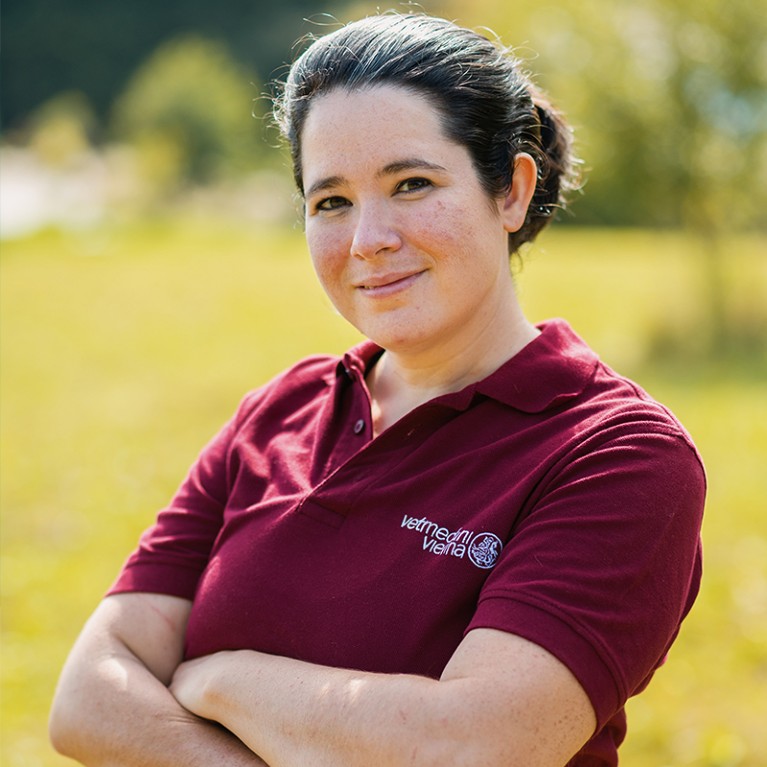
High US health-care costs and uncertainties around LGBTQ rights soured Jennifer Colbourne’s views on a US post.Credit: Thomas Suchanek
JENNIFER COLBOURNE: Will there be adequate health care and queer rights?
PhD candidate in animal behaviour and cognition at the Messerli Research Institute in Vienna.
After I completed my master’s at York University in Toronto in my home country of Canada, there weren’t a lot of PhD options here in my narrow field, so I had to choose where to move abroad. I was already feeling uncomfortable about the United States because of the lax gun laws, but I also have health conditions that I need to consider. I knew that universities offer insurance, but I worried that it might not adequately cover my needs.
In late 2017, there was a period of time when a US Republican party plan to update taxes included a provision to heavily tax graduate-student tuition waivers. That piece of the plan eventually got dropped, but I realized that things can change very quickly in the United States. I was not going to risk going to a country where I could be destitute — either through health-care costs or because of a rapidly shifting tax environment.
Now I’m in Europe doing my PhD in Austria, and I get paid around €30,000 (US$29,800) a year, including five weeks’ paid holiday. I also receive a retirement pension plan, and the health care, which is largely publicly funded, is wonderful. I have no complaints. Now I have a year left, and am looking for postdoctoral positions. It hasn’t even crossed my mind to apply for US funding. One of the chief reasons is that it’s not a great place for people like me who identify as queer. From the transphobic laws to protests against drag queens to the horrific shooting that left 49 people dead at the gay nightclub Pulse in Orlando, Florida, in 2016, the United States seems to be a place where it’s dangerous to present as anything other than cisgender and straight.
In July this year, I went to the Animal Behavior Society conference in Costa Rica, which I found to be very LGBTQ-friendly. The organization had planned to have its 2023 meeting in Knoxville, Tennessee. But I was one of the more than 50% of society members who voted not to attend if it was held in a state passing anti-transgender laws — that ban transgender athletes from competing in women’s sports or deny transgender students use of the bathrooms consistent with their gender identity — and restricting a woman’s right to an abortion, such as Tennessee. I wouldn’t feel good spending money there or walking the streets. The society subsequently rescheduled the 2023 meeting to be held in Portland, Oregon.
UMAR AHMAD: Visa woes and questioning whether Black Lives Matter
Cancer researcher at Bauchi State University in Gadau, Nigeria.
I earned my PhD at University Putra Malaysia in Serdang in 2020 for a project to develop a targeted therapy for bladder cancer. After that, I returned to my home country of Nigeria. I currently lead the anatomy department at Bauchi State University, where I am passionate about genomics, bioinformatics and open science. Both the United States and Canada have top-ranking institutions and researchers in these areas, and I have applied for postdoctoral positions in both countries.
I have a preference for Canada, based in part on advice I received from colleagues. Both postdocs and principal investigators recommended that I go there because, they say, a visa to do a postdoc in the United States is very problematic to get. [Editor’s note: International postdocs in the United States typically use the study-based-visitor (J-1) or the specialty-occupation (H-1B) visas.] Even if you get a visa, it can be challenging to renew. And I was told that these US visas can’t easily be used to seek citizenship without a permanent position. By contrast, in Canada, a visa can count towards permanent residence.
The other big concern is gun violence, which seems to have increased in the United States. That is scary — especially given that Black populations in the United States are targeted by police.
I’m finding that it takes a considerable amount of time to get a visa for Canada as well, especially for Nigerians. I was offered a cancer-bioinformatics postdoctoral position at Memorial University in St John’s, and I’ve been waiting 11 months so far for my visa to be approved. I just want to find the best place to do my science.
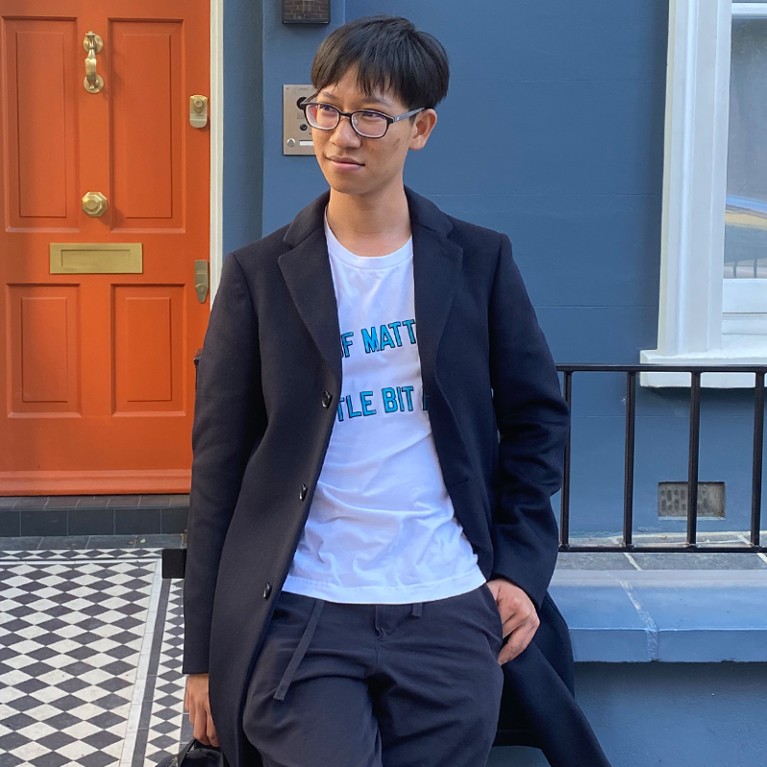
Tanadet Pipatpolkai says US safety concerns and the high cost of living deterred him from studying there.Credit: Tanadet Pipatpolkai/Thanakorn Lerkpichayayotin
TANADET PIPATPOLKAI: Pursuing research has to be safe and affordable
Postdoc in molecular biophysics at the KTH Royal Institute of Technology in Stockholm.
In 2020, as I was finishing my PhD at the University of Oxford, UK, studying ion channels, membrane transport and disease, I didn’t really consider applying for positions in the United States for a number of reasons. For one thing, Europe is geographically closer to Thailand, which makes getting home not as arduous for me as it would have been had I moved across the Atlantic.
I spent a few days at Yale University in New Haven, Connecticut, during PhD interviews in 2017. Although it looked like a fun and inspiring place, I did experience a sudden, odd, unsafe feeling, especially when students mentioned that it was best not to live too far from campus for safety reasons. The university provided a shuttle bus to take you from student housing to the university, but I preferred to live in a place where you can walk at night without concerns or the expense of a taxi. My other concern was health-care costs, because students and postdocs in the United States typically get minimum levels of insurance coverage. In the United Kingdom and Scandinavia, I’ve had to pay only minimal surcharges for any health issue.
I began my postdoc in October last year. Next year, ideally, I plan to start looking for tenure-track assistant-professor positions, but if I can’t find anything I’ll look for a second postdoc. Earlier this year, after attending the Biophysical Society’s annual meeting in San Francisco, California, I thought about applying to universities in that state because the weather is amazing and it seemed like it could be a good fit. But the rent sounds atrocious and doesn’t match well with a postdoc’s salary. I also found the level of homelessness there disturbing. I have also considered applying to laboratories in Ithaca, New York, as well as in Chicago, Illinois, and St Louis, Missouri, large cities with notable gun violence. Given news stories of hate crimes against Asians, my family and I agree that safety is the biggest factor to consider.
I think back to the early twentieth century, when people who pursued science did so with their own money and out of sheer curiosity or their love (or madness) for the subject. I think we’re going back to science being essentially a hobby pursued by people who can afford to do research. But even if you are doing science as a hobby, you don’t want to worry about your health-care or childcare costs. In many European countries, those things are often provided or subsidized, those are on the table for you.
ASHLEIGH BARRETT-YOUNG: Finding US politics and society too extreme
Postdoctoral researcher in psychology at the University of Otago in Dunedin, New Zealand.
As I was finishing my PhD at the University of Otago in 2021, I did think about looking for a postdoc outside New Zealand. But, to be honest, I didn’t even consider the United States.
One of the biggest concerns for me, because I have a family to consider, is gun violence. I’m aware that we see only a particular media representation, but every time the United States is in the news, it seems as if it’s because of mass shootings. That is baffling to me, coming from New Zealand. We banned semi-automatic weapons and constructed a buy-back programme in 2019, following a mass shooting in Christchurch. I have very rarely seen a person carrying a gun, and I feel as if it would be a big culture shock.
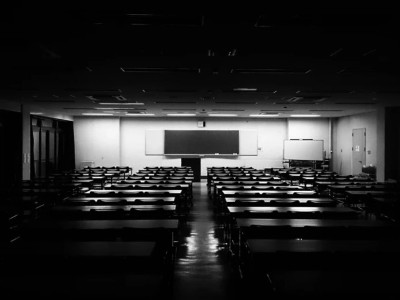
More international students were coming to US universities — then COVID hit
Other political events are equally disconcerting. The June 2022 US Supreme Court ruling that overturned Roe v. Wade and a national right to abortion is terrifying to see, as is the rolling back of transgender rights. As someone who leans to the left politically, I find the US leftist parties are still pretty conservative in their social policies compared with New Zealand and the rest of the world — although I was glad to see the administration of President Joe Biden moves towards open-access science and forgiveness of student-loan debt.
Most of the postgraduates in New Zealand who head abroad go to Australia, the United Kingdom or European Union countries. I don’t have a perception that the United States is considered a more coveted place to study, nor do I think others here would buy into the idea of ‘American exceptionalism’. I would consider going to a US-based conference, but I haven’t travelled much in recent years owing to the pandemic. I was troubled watching the US pandemic response from the sidelines. It wasn’t just the lack of measures to address the pandemic, it was the complete inability to follow the science. We had people in New Zealand protesting against mandates for vaccines or wearing masks, but they were in the clear minority. Yet US society’s reaction — ‘my personal inconvenience is more important than your health’ — was horrifying.

